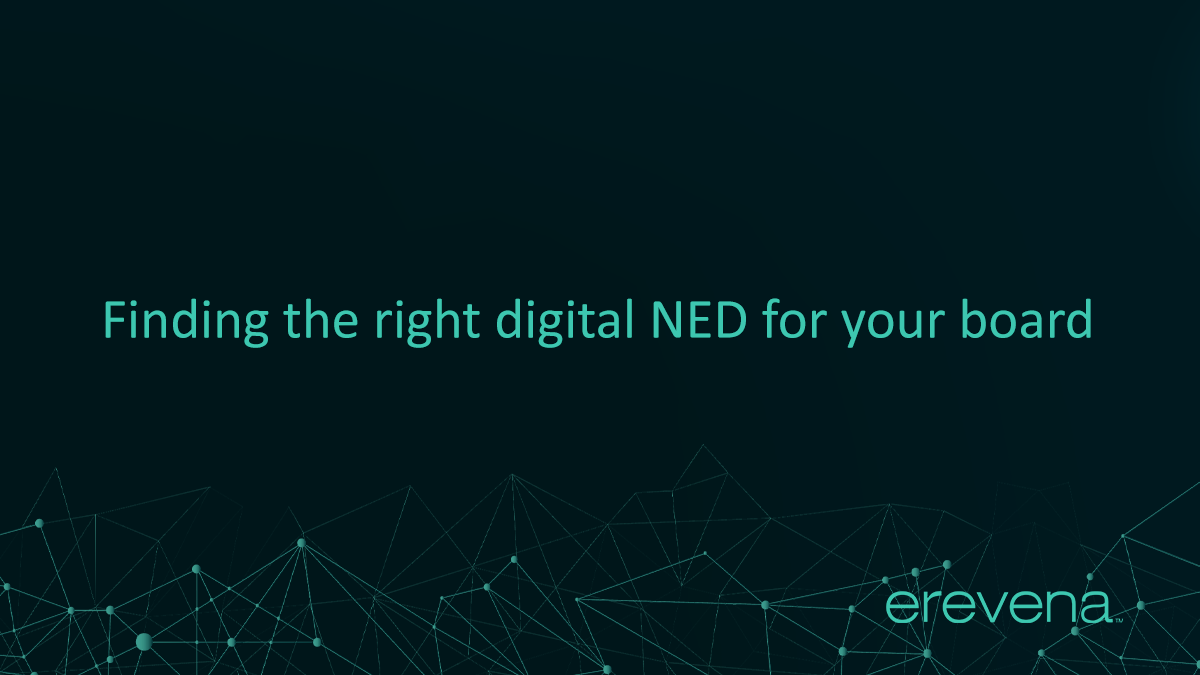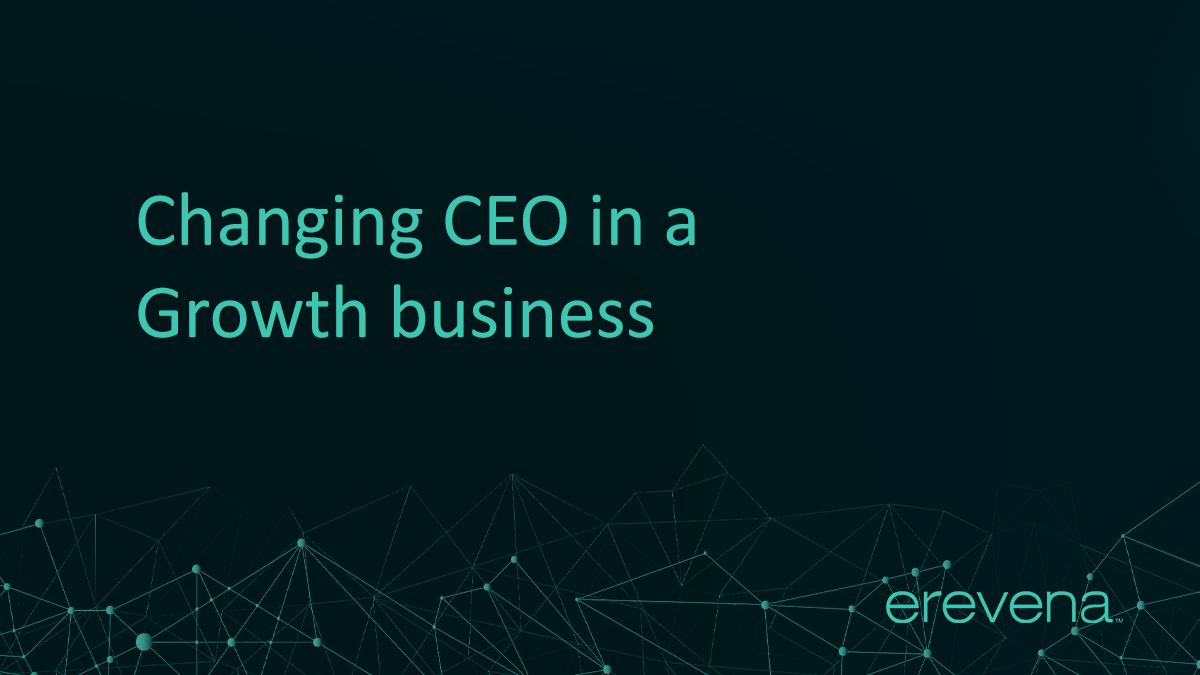The need to add digital skills to Boards has become a hot topic. Everyone wants a digital NED, but finding the right fit for your Board remains a challenge. Maria Josife shares her experience in placing Non-Executives and Chairs to the Boards of high-growth businesses.
There is a buzz around town. In these COVID-clad heady days of e-commerce, where everyone (even your mum) seems to have figured out how to use the internet, there is a sense that things have changed. And may never be the same again. Someone has suddenly pressed fast-forward on the digital world, and a transition that may have taken a decade has landed hard.
For those with very formed digital businesses, this has been a bumper time, especially across ecommerce and entertainment. For those unprepared, the realisation has hit that time is running out.
The need to add digital skills to Boards has become a hot topic. Everyone wants a digital NED. But, finding the right fit for your Board remains a challenge.
Digital is, and has historically been a misunderstood word, and means very different things to different businesses. More than anything, however, it is a word synonymous with change: doing business differently, interacting with customers in a different way and transacting with customers differently. Digital has been used to represent a “new world, with new rules”. The irony in all of this is that as it becomes a part of the fabric of a business, customers don’t see it as new, or remarkable or different at all. It just becomes another channel, another way of interacting in a single relationship that a customer might have with your brand.
What has become clear, for those that have deprioritized technology transformation, is that consumers are very quickly normalising around both great technology and great functionality and are using it as a means of discerning between one brand and another. How easily you are enabling your customers to interact with your services, ideally seamlessly, is fast becoming a key decision- making criteria for customers.
This change in consumer behaviour is being mirrored within businesses. We are starting to see the first generation of CEOs for whom digital is an implicit means of doing business. They are operating as Executives in a world where customer behaviours are changing. Whether they are in a pureplay or a multi-channel environment, they are implicitly experiencing the central role of technology in the evolution of the relationship between a business and its customers. Whether they are a digital native or simply have a digital mindset, technology is an unavoidable and important part of their commercial activity. The next generation of NEDs will not be “digital NEDS”, they will be NEDs for whom digital is a fundamental part of commercial life.
For today, however, the “digital NED” remains relevant. How then should you think about the appointment and what are the considerations?
What does digital mean to you?
The first question to address is what digital means to your business? Is digital a shop (ecommerce), a communication tool (digital marketing/ social media), one of a number of ways you will serve your customer (multi-channel/ omni-channel), a technology modernization platform (cloud), or a way in which to better understand or monetize your customer (data and personalisation)? Understanding the challenges you are facing as a business is the first step to understanding what influences you need around the table. Demystify digital by translating it into a language that you are comfortable with.
Where you are on your journey and your level of ambition?
What is your present situation and how well do you understand your future? Readiness and the role you need someone to play are also key considerations. Some businesses are behind and need transforming or completely modernising; others have much more established digital and technology capability that needs another level of innovation. Some want to acquire digital capability through M&A activity. Some want to build their own capability or work with partners to develop it. Some are ready for a more radical approach to their future strategy; others need to get the basics right. Understanding where you are on that continuum and what influences you need will also inform the kind of person you need and their experiences. A disruptive digital influence (e.g. someone from a more innovative pure-play or high growth business) may be relevant for some, but for others, someone who has delivered change in the context of a legacy business may be much more relevant. For other companies, hiring someone who has just managed a digital business will bring enough insight to deliver meaningful impact.
Too often these considerations are typified as the pureplay vs digital transformation debate, but that is too basic for today’s digital world. Not all pure plays are all that modern. Many are scaled organisations, facing disruption from new incumbents, with plenty of legacy issues of their own.
How significant is your investment in technology, how much do you engineer internally and how central to your business model is it?
This is also important and rarely discussed. Some businesses (including legacy brands) are making huge investments in technology and are spending large sums on proprietary systems. That technology may become totally central to the way your business does business and central to the way your business is valued by your shareholders. The role technology plays in your business and its centrality may delineate to what extent you may want to consider NEDs from a technology/ technical product vs commercial background.
How are you measuring your NEDs contribution?
NEDs invariably cannot be single-issue constituents and need to be able to contribute effectively across a range of topics and business issues. “A range of issues”, doesn’t need to mean every issue, and it’s worth reflecting on our earlier point that digital is often synonymous with change. Your digital NED will often represent something new vs the traditional players within your boardroom. For that reason, measuring their contribution against a traditional NED is probably irrelevant. What can they help with? Strategy, Customer, Growth, Culture are the big issues. Some will index well to leadership at scale or leadership in change. Some will know more about organic growth vs acquisitive growth. But in the main that person is there to hold the business and executive to account over its future, and its anticipation of the threats that will face the business in the near term, and to support the Executive in preparing for that future. They should bring a fresh perspective, a stimulating view, a lens on what is to come. They should also bring a more implicit understanding of technology spend and ROI (although different sectors have a very different perspective to buy vs build vs partner and one should always keep this in mind).
Making the appointment work
As with anything different, it often takes some adjustment. Digital NEDs will often have a lot to absorb about the business they are joining, and the Board will need to adjust to a different style of input. The Chair may have to invest more time in integrating that person on to the Board. The quid pro quo is that the Digital NED will usually dive in with the Executive in a more active/proactive way. Many digital NEDS (but not all), will be serving executives vs plural, and will consequently have less Board experience than a traditional NED. This will be an adjustment, but again we are seeking difference in this appointment, not more of the same, and this needs to be reflected in the way we embrace their contribution.
There will be a time when the digital NED is no longer required. A little like their long-lost cousin the Chief Digital Officer, this appointment will be reflected only in the annals of time. Over time, every NED will in some way be digital, reflecting the new normal of business in general. For now, however, we can work to integrate more digital talent into both public and private Boards to ensure a healthier future for the companies for whom they serve.
Share this article:













